 Dansk Flygtningehjælp (The Danish Refugee Council) – Frivilligbladet (The Volunteer Post)
Dansk Flygtningehjælp (The Danish Refugee Council) – Frivilligbladet (The Volunteer Post)
Dansk Flygtningehjælp (The Danish Refugee Council), has just published the latest issue of Frivilligbladet (The Volunteer Post). This time they have a piece on our trip to Ringkøbing in the western part of Denmark, and I’m very proud to be featured in it.
Besides the fact that the article basically is an interview with yours truly, it’s also accompanied by pictures taken by me. I’m really, really proud and humbled by this.
Since the article is in Danish, I’m hereby publishing an English language translation.
FROM MJØLNERPARKEN TO WESTERN JUTLAND
Frivilligbladet Volume 3, 2006, written by Bente Bækgaard
It’s a long distance from Mjølnerparken in Copenhagen to Western Jutland (the main peninsula of Denmark). Despite that fact a group of volunteers from Mjølnerparken had success going on a trip with 21 children to Hee near Ringkøbing. The trip became a success, in part because it was planned in close co-operation with the volunteer group in Ringkøbing as well as local partners.
Sea, sun and blue skies. 42 brown legs from Mjølnerparken are streaking across the sandy dunes and into the roaring North Sea. In the background is a group of volunteers. They’re also from Mjølnerparken. They’re the organisers of the vacation trip to Western Jutland, aided by two consultants, the volunteers from Ringkøbing and local partners from Mjølnerparken.
Co-operation
“The idea behind the trip surfaced after the yearly assembly in April, where our volunteer consultant had talked to the volunteers in Ringkøbing about the possibility of arranging a vacation trip. We felt that that was a great idea, that we wanted to help realising.” says Kim Bach, who has acted as the co-ordinator of the trip.
Shortly after the yearly assembly of the volunteers in April, he and seven other volunteers from the group in Mjølnerparken contacted the group in Ringkøbing. And the planning of the vacation trip had started.
Aid from the group in Ringkøbing
The alliance with the group of volunteers from Ringkøbing turned out to be a huge asset for the volunteers from Mjølnerparken. The volunteers didn’t have much previous knowledge of the possibilities in the western part of Jutland, so at that point the local partner came to the rescue: “It was a great help having some locals to co-operate with. They have much more knowledge of the area than we do, and besides that, they also know our target group. This means that they quickly can point us in a direction that is interesting for us”, says Kim Bach.
The volunteers from Ringkøbing helped us locate a place to stay, and to find activities for the children. To top this, the volunteers from western Jutland arranged that the children from Mjølnerparken, got access to the control tower in the harbour in Hvide Sande, and they saw how the sluice that give boats access to the harbour is controlled. The local contacts seems to be able to open sluice gates as well.
Klub 36
One thing that the volunteers were aware of, after deciding to go through with the project: it will become a challenge to get the children to sign up for the trip.
In order to avoid the classical horror of volunteer work: that no one shows up, the volunteers chose to co-operate with Klub 36, a local club in Mjølnerparken: “We chose to work with Klub 36, because they have a strong network in Mjølnerparken and a good contact with the parents of the children, there’s no doubt that the many sign-ups also can be attributed to the fact that two workers from Klub 36 took part in the trip, and that the invitations were circulated in their network”, says Kim Bach. He adds that the group of volunteers also leveraged another offer from the group, the volunteers that offer private tutoring in the private homes of the children, “hjemmelektiehjælpen”. “The benefit of our private tutoring offer is that the volunteers have a close relationship with the parents of the children, and the parents are much more inclined to permit their children to take part, if they know the people behind”, Kim Bach adds.
The strategy of the volunteers paid off. The sign-ups poured in, and the volunteers had to create a waiting-list. The only drawback of the strategy was, according to Kim Bach, that the group of children weren’t as mixed as we originally had envisioned: “We would have like to have more children of Danish ethnicity to take part in the trip, but we didn’t succeed,†Kim Bach says and adds, that the volunteers next year will do more to gather a more ethnically mixed group.
Volunteer work in rural areas
It turned out that the trip to Western Jutland did more than open the eyes of the children. The volunteers that took part in the trip, also discovered how the volunteers in rural areas work: “Through the co-operation with the group of volunteers in Ringkøbing, we discovered the great differences between volunteer integration work in different parts of Denmark. It’s my impression that the volunteers in Ringkøbing spends a lot of time doing volunteer work. “Our” volunteers don’t have that much time. On top of that the volunteers in rural areas has a much closer co-operation with the local authorities. While we were in the Western Jutland, a number of Burmese refugees arrived, to be settled in Ringkøbing. It was interesting to hear, how the authorities involve the volunteers in that task. “We don’t do things like that at all†says Kim Bach.
 Yesterday I went to see the documentary “An Inconvenient Truth”, a documentary that follows former vice-president Al Gore’s struggle to spread global awareness of the crisis facing humanity as a result of global warming.
Yesterday I went to see the documentary “An Inconvenient Truth”, a documentary that follows former vice-president Al Gore’s struggle to spread global awareness of the crisis facing humanity as a result of global warming.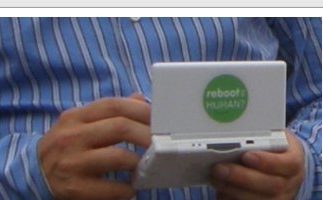

 Dansk punk år for år…foreløbig til ’83 –
Dansk punk år for år…foreløbig til ’83 –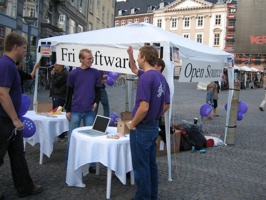
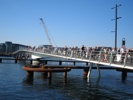
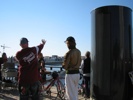
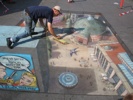




 The big hardware news was, breaking with the tradition of not commenting on unreleased products, the announcement of a digital set-top box code-named the iTV. The iTV is a “real” digital set-top box, it looks like it’s a thin iTunes/FrontRow streaming client, think of it as “AirVideo” or “AirPort Express/Video”. Apple seems to be skipping analogue all together for their entertainment centre strategy, this makes good sense, and was somewhat what I expected, but it’s still somewhat visionary and definitely an example of different thinking, and I applaud the boldness of Apple here. I’m looking forward to more details on this cool new product.
The big hardware news was, breaking with the tradition of not commenting on unreleased products, the announcement of a digital set-top box code-named the iTV. The iTV is a “real” digital set-top box, it looks like it’s a thin iTunes/FrontRow streaming client, think of it as “AirVideo” or “AirPort Express/Video”. Apple seems to be skipping analogue all together for their entertainment centre strategy, this makes good sense, and was somewhat what I expected, but it’s still somewhat visionary and definitely an example of different thinking, and I applaud the boldness of Apple here. I’m looking forward to more details on this cool new product.